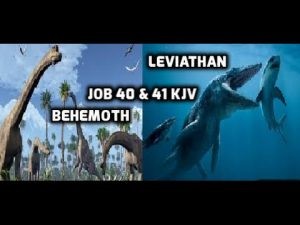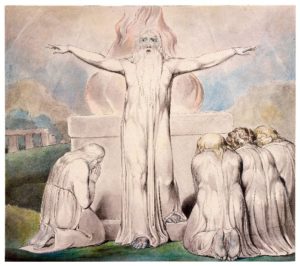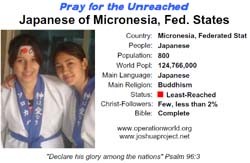 We complete our reading of the Book of Job today.
We complete our reading of the Book of Job today.
Job has endured many trials. He has suffered losses, afflictions, and accusations.
Although Job was perplexed about his circumstances, and at times offered complaints, yet he maintained his conviction that God is worthy of worship.
He had been mighty in his rebuttals to the accusations of his friends, but when called upon to answer God, there is the pause of silence.
 God asks Job to present his case, asking, “Will the faultfinder contend with the Almighty?”
God asks Job to present his case, asking, “Will the faultfinder contend with the Almighty?”
Job has no case to present. He has nothing to say. He is beginning to see himself in a new light. He who had been so strong in his assertions is now humbled and broken.
Job 40:4 4 “Behold, I am insignificant; what can I reply to You? I lay my hand on my mouth.
He was learning the lesson that we recognize more clearly in the New Testament when Paul confessed,
Romans 7:18a 18 For I know that nothing good dwells in me, that is, in my flesh.
God’s self-revelation will silence all boasting. The Book of Romans reminds us that the revelation of God’s righteousness in the Law was not given to show us how righteous we are, but how righteous we’re not! It is given so that we might lay our hands over our mouths.
 Romans 3:19 19 Now we know that whatever the Law says, it speaks to those who are under the Law, so that every mouth may be closed and all the world may become accountable to God.
Romans 3:19 19 Now we know that whatever the Law says, it speaks to those who are under the Law, so that every mouth may be closed and all the world may become accountable to God.
So Job’s mouth is shut. God has more to say. Job is ready to listen.
Once tight-fisted in his angry reaction to his circumstances, Job is now humbled, open-handed, and open-hearted. He is ready to receive what is to be the outcome of the Lord’s dealings, a revelation of God’s mercy and compassion.
And this is what we learn from James in the New Testament.
James 5:11 11 We count those blessed who endured. You have heard of the endurance of Job and have seen the outcome of the Lord’s dealings, that the Lord is full of compassion and is merciful.
Job is not blessed because He endured. He endured because He was blessed.
Job is silent, but is he submissive?
We dare not put ourselves in God’s place as Judge, for our knowledge is so limited. We were not there when God created the universe. Nor do we understand the complexities of His designs.
God asks Job, “Will you subdue my creation?”
As evidence of God’s exceeding wisdom and power, God gives Job the examples of two of his mightiest creatures, the behemoth, and the leviathan. These two different creatures of complex design are creatures that mankind had better not attempt to contend with because of their overpowering strength.
 Scholars have debated whether these creatures refer to the hippopotamus and crocodile or some other mighty created beings such as a dinosaur. The word ‘behemoth’ means ‘superbeast’ in Hebrew. God in his mercy did not make this creature carnivorous, or Job would be on his dinner plate.
Scholars have debated whether these creatures refer to the hippopotamus and crocodile or some other mighty created beings such as a dinosaur. The word ‘behemoth’ means ‘superbeast’ in Hebrew. God in his mercy did not make this creature carnivorous, or Job would be on his dinner plate.
In Job’s day it would be next to impossible to capture a hippopotamus, but in contrast, easy to capture a man.
 In Job 41, God speaks of the ‘leviathan’. The root of the Hebrew word ‘leviathan’ means ‘to twist’ or ‘to writhe’. This creature found in the water could refer to a whale or a crocodile. It could be a Spinosaurus or another creature. The Jews used the word to describe their enemies, such as Egypt, as the Bible uses the word ‘serpent’ to describe the adversary, Satan (Revelation 12:9).
In Job 41, God speaks of the ‘leviathan’. The root of the Hebrew word ‘leviathan’ means ‘to twist’ or ‘to writhe’. This creature found in the water could refer to a whale or a crocodile. It could be a Spinosaurus or another creature. The Jews used the word to describe their enemies, such as Egypt, as the Bible uses the word ‘serpent’ to describe the adversary, Satan (Revelation 12:9).
Isaiah 27:1 1 In that day the LORD will punish Leviathan the fleeing serpent, With His fierce and great and mighty sword, Even Leviathan the twisted serpent; And He will kill the dragon who lives in the sea.
Psalm 74:13-14 13 You divided the sea by Your strength; You broke the heads of the sea monsters in the waters. 14 You crushed the heads of Leviathan; You gave him as food for the creatures of the wilderness.
Man cannot make a leviathan his house pet. Nor can we make God our house pet (Job 41:5). The leviathan is not to be toyed with.
Job 41:8 8 “Lay your hand on him; Remember the battle; you will not do it again!
Job 41:34b “He is king over all the sons of pride.”
Job, who has offered mighty defiant speeches towards his friends, is now broken before God. One cannot receive blessings from God with our fists clenched in anger.
James 5:11 11 We count those blessed who endured. You have heard of the endurance of Job and have seen the outcome of the Lord’s dealings, that the Lord is full of compassion and is merciful.
Job 42:1-3 1 Then Job answered the LORD and said, 2 “I know that You can do all things, and that no purpose of Yours can be thwarted.
He then makes his confession and repents:
 Job 42:3-6 3 ‘Who is this that hides counsel without knowledge?’ “Therefore I have declared that which I did not understand, Things too wonderful for me, which I did not know.” 4 ‘Hear, now, and I will speak; I will ask You, and You instruct me.’ 5 “I have heard of You by the hearing of the ear; But now my eye sees You; 6 Therefore I retract, And I repent in dust and ashes.”
Job 42:3-6 3 ‘Who is this that hides counsel without knowledge?’ “Therefore I have declared that which I did not understand, Things too wonderful for me, which I did not know.” 4 ‘Hear, now, and I will speak; I will ask You, and You instruct me.’ 5 “I have heard of You by the hearing of the ear; But now my eye sees You; 6 Therefore I retract, And I repent in dust and ashes.”
This is a noble confession. Job surrenders to the greatness of God, which includes the greatness of His mercy. Job is given no explanation of the reason for his trial, but the trial is forgotten in the light of God’s compassion.
In the end of the Book, Job is still unaware of Satan’s role in the assault made upon his soul. The Apostle Peter was tested in a trial by Satan (Luke 22:31). So was the Apostle Paul (2 Corinthians 12:7-10) but they were both made aware that Satan was behind their ordeals. Job was not.
 The epilogue is beautifully constructed to vindicate God’s faithfulness to Job.
The epilogue is beautifully constructed to vindicate God’s faithfulness to Job.
First, the Lord deals with Job’s accusers. In His wrath, He rebukes Eliphaz, Bildad, and Zophar. He calls upon them to get right with Him by offering seven sacrifices of both bulls and rams (seven- standing for perfection- a picture of the perfect sacrifice of Christ). He then calls Job, “My Servant” and calls him to intercede for his friends.
Job’s friends intended to restore Job by philosophy. Job intends to restore his friends by prayer.
Job 42:10 10 The LORD restored the fortunes of Job when he prayed for his friends, and the LORD increased all that Job had twofold.
God was not obliged to act this way, but He doubled all that Job had lost in his trial. Notice that the Lord said that he increased ALL that Job had twofold. He gave Job twice the number of livestock, but only the same number of children to replace those who were killed. What does this mean? It means that Job’s other children were still Job’s family. There was no afterlife for the cattle and herds. Although Job’s sons and daughters had died, they still lived in the afterlife and were still reckoned as Job’s family. This is another great assurance of the fact that our souls are eternal.
While half of Job’s family was in heaven, he was given another family on earth.
It is encouraging to read that Job’s daughters received inheritance as well as his sons.
The Book of Job concludes:
Job 42:16-17 16 After this, Job lived 140 years, and saw his sons and his grandsons, four generations. 17 And Job died, an old man and full of days.
In the end, Job is humbled. He has a fresh understanding of the majesty of God and his own unworthiness in God’s sight. He also gets to see that God is amazingly merciful.
Instead of ripping his friends apart for their misjudgments, he extends to them the mercy he has received and engages in priestly intercession.
The school of suffering has profited Job. It will also profit us if we trust God. Listen again to Job’s confession:
Job 42:5-6 5 “I have heard of You by the hearing of the ear; But now my eye sees You; 6 Therefore I retract, and I repent in dust and ashes.”
TODAY’S READING FROM THE NEW TESTAMENT – 2 CORINTHIANS 5:11-21
 Knowing that we all appear before Christ at the judgment, we do not live passively. Paul speaks of his motivation in ministry.
Knowing that we all appear before Christ at the judgment, we do not live passively. Paul speaks of his motivation in ministry.
He recognizes that Jesus is Lord, Savior, and Judge. HE is motivated by the fear of the Lord (5:11) and the love of Christ (5:14). When Paul speaks of the love of Christ, he is not referring to his love for Christ, but Christ’s love towards Him. That love towards Paul and his fellow workers motivated Christ to die for them. That love motivates them to endure all things, denying themselves and living for God’s glory and the good of others.
2 Corinthians 5:14-15 14 For the love of Christ controls us, having concluded this, that one died for all, therefore all died; 15 and He died for all, so that they who live might no longer live for themselves, but for Him who died and rose again on their behalf.
The love of God expressed in the finished redemptive work of Christ on the cross gives Paul a totally new perspective. He sees every human soul as a candidate for God’s grace.
2 Corinthians 5:16 16 Therefore from now on we recognize no one according to the flesh; even though we have known Christ according to the flesh, yet now we know Him in this way no longer.
He also sees himself and all other believers in a new light.
2 Corinthians 5:17 17 Therefore if anyone is in Christ, he is a new creature; the old things passed away; behold, new things have come.
How do you see yourself, your brothers and sisters in Christ, and those who are lost?
The God who reconciled us to Himself through the finished work of Christ has also given us a ministry to see people in this light as potential candidates for God’s grace.
2 Corinthians 5:20 20 Therefore, we are ambassadors for Christ, as though God were making an appeal through us; we beg you on behalf of Christ, be reconciled to God.
Because of the life or death nature of our message, we are not casual in our approach but very earnest. We must intentionally call people to repentance and faith.
And the crux of our message is the message of the ‘crux’ (the cross):
 2 Corinthians 5:21 21 He made Him who knew no sin to be sin on our behalf, so that we might become the righteousness of God in Him.
2 Corinthians 5:21 21 He made Him who knew no sin to be sin on our behalf, so that we might become the righteousness of God in Him.
What a rich exchange! Jesus became the perfect sin offering. Jesus, the spotless Lamb of God, allowed Himself to be treated by God the way we deserved to be treated as sinners, so we could be treated by God the way He deserves to be treated as absolutely righteous.
TODAY’S READING FROM THE BOOK OF PSALMS- PSALM 45:1-17.
 Psalm 45 is a song addressing a King written by a ready scribe. It is intended to address a king in David’s line, but we can see it as Messianic, in that the glory of the King of Kings, Jesus Christ, is in view.
Psalm 45 is a song addressing a King written by a ready scribe. It is intended to address a king in David’s line, but we can see it as Messianic, in that the glory of the King of Kings, Jesus Christ, is in view.
This is a Psalm about the royal wedding. The beauty, grace, and majesty of the king is described in the opening verses.
Verses 4-5 bring to mind Christ’s glory at His return at the last battle in the Book of Revelation.
 Revelation 19:11-16 11 And I saw heaven opened, and behold, a white horse, and He who sat on it is called Faithful and True, and in righteousness He judges and wages war. 12 His eyes are a flame of fire, and on His head are many diadems; and He has a name written on Him which no one knows except Himself. 13 He is clothed with a robe dipped in blood, and His name is called The Word of God. 14 And the armies which are in heaven, clothed in fine linen, white and clean, were following Him on white horses. 15 From His mouth comes a sharp sword, so that with it He may strike down the nations, and He will rule them with a rod of iron; and He treads the wine press of the fierce wrath of God, the Almighty. 16 And on His robe and on His thigh, He has a name written, “KING OF KINGS, AND LORD OF LORDS.”
Revelation 19:11-16 11 And I saw heaven opened, and behold, a white horse, and He who sat on it is called Faithful and True, and in righteousness He judges and wages war. 12 His eyes are a flame of fire, and on His head are many diadems; and He has a name written on Him which no one knows except Himself. 13 He is clothed with a robe dipped in blood, and His name is called The Word of God. 14 And the armies which are in heaven, clothed in fine linen, white and clean, were following Him on white horses. 15 From His mouth comes a sharp sword, so that with it He may strike down the nations, and He will rule them with a rod of iron; and He treads the wine press of the fierce wrath of God, the Almighty. 16 And on His robe and on His thigh, He has a name written, “KING OF KINGS, AND LORD OF LORDS.”
Psalm 45:4 4 And in Your majesty ride on victoriously, for the cause of truth and meekness and righteousness; Let Your right hand teach You awesome things.
Verse 6 is quoted in reference to Christ in Hebrews Chapter 1
Hebrews 1:8 8 But of the Son He says, “YOUR THRONE, O GOD, IS FOREVER AND EVER, AND THE RIGHTEOUS SCEPTER IS THE SCEPTER OF HIS KINGDOM.
We see Jesus as the Anointed One, above all else. He is anointed with the oil of joy.
Psalm 45:7 7 You have loved righteousness and hated wickedness; Therefore God, Your God, has anointed You With the oil of joy above Your fellows.
Have you experienced the joyous satisfaction that the Father has with the person and work of His Son?
Verses 10-12 speak of the loyalty of the bride to her head, the King.
Psalm 45:10-12 10 Listen, O daughter, give attention and incline your ear: Forget your people and your father’s house; 11 Then the King will desire your beauty. Because He is your Lord, bow down to Him. 12 The daughter of Tyre will come with a gift; The rich among the people will seek your favor.
She is made glorious by the King and is presented to the king. This relationship of the bride to the bridegroom King is reflected in marriage, according to Paul’s letter to the Ephesians.
 Ephesians 5:25-27 25 Husbands, love your wives, just as Christ also loved the church and gave Himself up for her, 26 so that He might sanctify her, having cleansed her by the washing of water with the word, 27 that He might present to Himself the church in all her glory, having no spot or wrinkle or any such thing; but that she would be holy and blameless.
Ephesians 5:25-27 25 Husbands, love your wives, just as Christ also loved the church and gave Himself up for her, 26 so that He might sanctify her, having cleansed her by the washing of water with the word, 27 that He might present to Himself the church in all her glory, having no spot or wrinkle or any such thing; but that she would be holy and blameless.
The all-glorious King is to be reflected in the glorious bride, daughters and sons (45:13). Christ is coming for His church which is being made all glorious.
The complete triumph of Christ and His church are prefigured in this Psalm.
Psalm 45:17 17 I will cause Your name to be remembered in all generations; Therefore the peoples will give You thanks forever and ever.
Ephesians 3:21 21 to Him be the glory in the church and in Christ Jesus to all generations forever and ever. Amen.
TODAY’S READING FROM THE BOOK OF PROVERBS- PROVERBS 22:14
Proverbs 22:14 14 The mouth of an adulteress is a deep pit; He who is cursed of the LORD will fall into it.
PRAY FOR THE NATIONS – MICRONESIA
 Federated States of Micronesia
Federated States of Micronesia
Federated States of Micronesia
Pacific
Geography
 Area: 702 sq. km
Area: 702 sq. km
Over 600 coralline islands in four main groups: Chuuk, Pohnpei, Yap and Kosrae.
Population: 111,101 Annual Growth: 0.31%
Capital: Palikir
Urbanites: 22.7%
Peoples
 Peoples: 24 (4% unreached) All peoples
Peoples: 24 (4% unreached) All peoples
Unreached Peoples Prayer Card
Languages: 19 All languages
Religion
Largest Religion: Christian
| Religion | Pop % | Ann Gr | |
| Christians | 107,379 | 96.65 | 0.5 |
| Evangelicals | 27,006 | 24.3 | 0.9 |
Challenges for Prayer
A large proportion of the population is Protestant, the result of a century of ministry by US Congregationals and the German Liebenzell Mission, but nominalism and cronyism in leadership are widespread. Pray for revival among these long-standing groups. Pray also for the newer, fast-growing Pentecostal groups – negotiating the tension between traditional Micronesian culture and biblical practice is not straightforward.
PRAYER: Who is like You Lord? Thank You for Your boundless love and amazing grace. You are the Perfect Judge and mercifully the perfect Justifier. Thank You for opening our eyes and drawing us to receive Your provision of a perfect Savior, Jesus Christ. We embrace the perfect work of redemption that He accomplished with the spirit of thanksgiving. Help us to see ourselves as You see us, as a new creation in Christ. Help us to see others as You see them, not after the flesh, but as candidates for Your grace. Send us forth as Your ambassadors with the message of reconciliation. Fill us with boldness that we may effectively persuade people to be reconciled to You through faith in the gospel. In Jesus’ Name. Amen.
